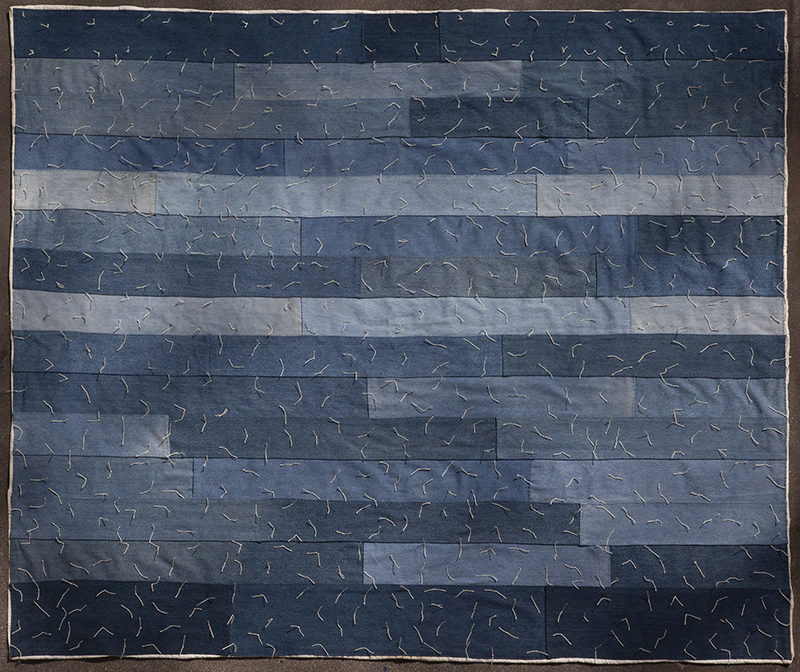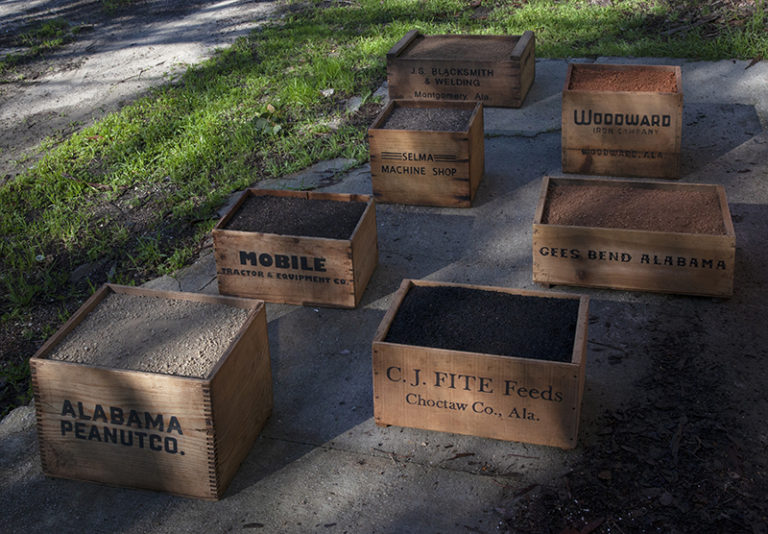Milwaukee-bred, California-based filmmaker James Benning’s current exhibit at MCASB is nothing less than a brilliant baklava of America, a solemn layering of the country’s heartbreaking agricultural and class history, turned out in the cool minimalism of the vanguard that followed Warhol.
“Portraits of America” presents works from across Benning’s practice, including screenings of his films, 20 Cigarettes (2011), READERS (2017) and After Warhol (2017), as well as installation and quilt work from his current Alabama Project (ongoing).
Nowhere in the show is Benning’s interest in ag, labor and class more poignant than in his quilts, made, in his words, of “poor whites” and “poor blacks.” There’s a soul-tingling familiarity for viewers from California’s ag lands, in which Santa Barbara is rooted, on approaching the denim patchwork of After Missouri Pettway (2019). Made from work clothes Benning collected at Central Valley flea markets, the quilt overlaps the history of undocumented and poor migrant workers with that of the quilters of Gees Bend, a former cotton plantation where the Alabama River takes a turn. Benning’s concern for America’s land history is clear in these quilts and brought full tilt in the artist’s crates of Alabama dirt.
The black belt of the deep South was named for the color of the rich soil of cotton plantations, and later for the skin color of the people who lived there after slavery. Benning’s installation, Portrait of 7 Boxes (2019), is a collection of Alabama dirt in different shades of brown. In wooden boxes, stamped with corporate logos, Benning references another fault line in American agricultural history: the colonial European purchases and theft of Native American communal lands.
The exhibition won’t disappoint fans of Benning’s seminal filmmaking either. 20 Cigarettes portrays 10 men and 10 women, some “lonely,” some with “no money,” differences in “color,” “age” and “country” of origin, and the most important difference for Benning, “class,” a lesson the artist learned growing-up in Milwaukee in “a white working-class ghetto built on prejudice.”
Benning’s films have famously experimented with duration. 20 Cigarettes registers the influence of Warhol’s screen tests: 20 people are filmed smoking a cigarette in full, for about three to seven minutes each, without uttering a word. The smoking was only a “ploy,” said Benning, so people wouldn’t focus on being filmed. Viewers don’t get an expedient though; you have to exercise your attention span. I found myself listening for clues to what was outside the frame, a kind of avant-garde detective’s game.
Portraits from film stills line a corridor in the main gallery. The images are framed to resemble Polaroid SX-70s, cropped closely and intimately, like Warhol’s Polaroids of friends. And there’s something unexpected: three worn-out passport-size photographs of Benning as a young man, and two of his daughter that he carried in his wallet for 30 years. The exhibit is Benning’s first solo show on the West Coast in a more than 40-year career. There’s a sense of retrospective, a spanning portrait of America, and no less, of the artist.


